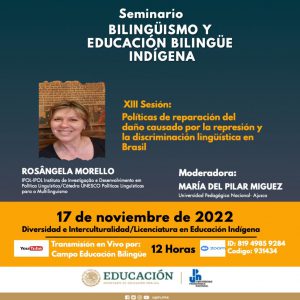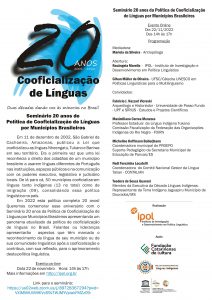Nova tecnologia promete mudar a realidade das exibições de cinema no Brasil
Nova tecnologia promete mudar a realidade das exibições de cinema no Brasil, beneficiando mais de 10 milhões de pessoas surdas, cerca de 600 mil pessoas cegas e outras 6,5 milhões de pessoas com baixa visão. Trata-se de um aplicativo de acessibilidade que reconhece o áudio do filme e sincroniza, em tempo real, os recursos de audiodescrição, legenda e LIBRAS (Língua Brasileira de Sinais). O lançamento acontece no dia 9 de novembro em um evento em Brasília, em uma sessão dublada do filme Caça Implacável, no Espaço Itaú de Brasília, a partir das 10 horas.
A ação é promovida pela Associação Brasileira das Empresas Exibidoras Cinematográficas Operadoras de Multiplex – ABRAPLEX e tem o objetivo de democratizar ainda mais o acesso à cultura e ao entretenimento, ampliando a acessibilidade de pessoas com deficiências em todas as salas de cinema do País. “Estamos, com isso, mudando a realidade de uma parcela significativa da sociedade que não tinha o cinema como parte do seu entretenimento”, salienta o presidente da ABRAPLEX, Marcos Barros.
Para Lúcio Otoni, presidente da FENEEC (Federação Nacional das Empresas Exibidoras Cinematográficas), a iniciativa também vai beneficiar os exibidores de pequeno e médio portes: “Além de democratizar o acesso, a nova tecnologia não implicará em aumento de custos para as empresas, principalmente nas cidades menores, o que é essencial para este momento em que retomamos as atividades após um longo período de paralisação”.
A previsão de tornar os cinemas mais inclusivos já estava na Instrução Normativa 165, da Agência Nacional do Cinema – Ancine, que indicava as distribuidoras e exibidoras como responsáveis pela disponibilização dos recursos de acessibilidade audiovisual ao público. Também de acordo com o Estatuto da Pessoa com Deficiência, o prazo para as salas de exibição fornecerem recursos de acessibilidade audiovisual às pessoas com deficiência era até a data 2 de janeiro de 2023.
O APP
Disponível em versões para Android e IOS, o aplicativo se chama MovieReading e é gratuito. Depois de instalado, ele reconhece o áudio do filme e sincroniza, em tempo real, os recursos de audiodescrição, legenda e LIBRAS. Assim, o usuário consegue escolher a melhor opção para acompanhar o filme em exibição. Os filmes com acessibilidade serão identificados com um selo acompanhado de um QR Code.
Além dos cinemas, outra vantagem é que a funcionalidade pode ser utilizada para assistir filmes em qualquer lugar, inclusive fora dos multiplex.
O aplicativo pode ser acessado em https://www.moviereadingbrasil.com.br/.
FONTE: Cenas de Cinema
Barreira linguística dificulta acesso de indígenas a direitos fundamentais
Pesquisa mostra como falta de tradutores, intérpretes, políticas públicas e legislação específica exclui indígenas e outras minorias linguísticas do exercício pleno da cidadania

Em um país profundamente desigual como o Brasil, uma das formas de exclusão social pouco discutidas é a linguística. Com aproximadamente 300 línguas faladas, além da língua portuguesa, indígenas e outras minorias linguísticas são excluídas de direitos fundamentais e do exercício da cidadania por dificuldades de acesso ao poder público. O assunto foi tema de uma tese de doutorado defendida no âmbito do Programa de Pós-Graduação em Humanidades, Direitos e Outras Legitimidades da Faculdade de Filosofia, Letras e Ciências Humanas (FFLCH) da USP.
A advogada Maria Teresa de Mendonça Casadei investigou problemas de comunicação e acesso a direitos da população indígena que não domina a língua portuguesa. A autora trabalhou em três linhas: identificar a existência de um novo ramo do direito que atendesse à acessibilidade linguística dos povos indígenas não falantes de português; construir uma teoria sobre esse novo direito e defini-lo na ordem jurídica brasileira; e apresentar possíveis soluções para que indígenas possam se comunicar e exercer seus direitos fundamentais.
Casadei constatou que o grau de acessibilidade linguística nos três poderes, na prática, é inexistente. No Poder Executivo, atualmente não existe política pública sobre o tema. No Legislativo, não há lei ou ato normativo a respeito da acessibilidade. E no Judiciário, a legislação prevê acompanhamento de tradutores e intérpretes em processos criminais, mas o indígena não desfruta do direito de se comunicar e ter acesso aos processos em sua língua tradicional.
“Infelizmente, constatamos que o Estado brasileiro, no âmbito de todos os poderes, não respeita as normas de caráter internacional e não confere ampla acessibilidade linguística aos indígenas”, afirma. A pesquisadora avalia que o grau de exclusão social fruto dessa inacessibilidade linguística é máximo. A análise de casos judiciais verificou diversas violações de direitos fundamentais.
Casadei cita indígenas enganados por bancos em empréstimos financeiros, indígenas segregados em depoimentos no Legislativo por não dominarem o português, o choque cultural em processos de adoção por crianças sem domínio do português. “Foram diversos casos identificados e relacionados para análise e demonstração da necessidade de medidas para integrar esses indígenas, um problema invisível em nossa sociedade.”
A autora, que fez um estudo de caso no Estado do Mato Grosso do Sul, região centro-oeste brasileira, também utilizou o termo “acessibilidade linguística” ineditamente. No estudo, Casadei afirma que a inacessibilidade atinge a liberdade do sujeito, causa segregação e discriminação, e por isso mesmo, viola os direitos humanos. “Pois é da condição humana a liberdade para se comunicar na língua escolhida”, defende. A advogada também assinala ser um direito do indígena se comunicar na língua materna por opção e resgata uma decisão judicial proferida em 1999, na qual um ministro se refere ao julgado como “índio alfabetizado, eleitor e integrado à civilização, falando fluentemente a língua portuguesa”.
Um novo direito
A tese provou a existência de um direito à acessibilidade linguística como um direito humano, ainda que não exista legislação nacional sobre o assunto. “Devendo ser cumprido independente de elaboração de lei que o regule, a despeito da existência de tratados internacionais que o Brasil seja signatário que intuitivamente resguardam o direito de comunicação do indígena”, explica.
Neste sentido, o trabalho mostrou também algumas tentativas de oficializar línguas indígenas (além do português) nas esferas municipais e estaduais. Na visão da pesquisadora, tais medidas não são suficientes. “Não é capaz de solucionar o problema, diante do vasto território nacional, da existência de inúmeras línguas faladas no Brasil, e diante do fato que o idioma é um assunto de ordem constitucional e não infraconstitucional.”
Casadei avalia que o Judiciário, no âmbito administrativo, está um passo à frente na questão da acessibilidade linguística. “Principalmente quando se analisa sua atividade jurisdicional, especialmente a jurisprudência firmada sobre o direito a um tradutor e intérprete, dispensando-os quando o indígena sabe se comunicar em português”, explica.
Porém, a inexistência de políticas públicas no Brasil e a jurisprudência não são suficientes para uma solução do problema. A pesquisadora explica que todos os atos corriqueiros para o exercício da cidadania precisam ser acessíveis aos indígenas. “É necessário garantir a presença de tradutores e intérpretes para indígenas nos principais atos de sua vida e para o exercício de seus direitos básicos e fundamentais”, afirma a pesquisadora.
Ela cita como exemplos a tradução de leis, cartilhas sobre cidadania nas línguas indígenas, intérpretes em atendimento em postos de saúde, tradução de receitas médicas, audiências judiciais e depoimentos com suporte de intérpretes, entre outros. “O Estado deve dispor de ferramentas de tradução e interpretação e um atendimento feito, preferencialmente, por indígenas bilíngues. Somente assim podemos esperar uma relação comunicativa de igualdade, em que todos possam compreender e ser compreendidos, respeitando-se os costumes e a tradição dos povos indígenas brasileiros”, completa.
A autora conclui que os indígenas padecem com a imposição do idioma português e as dificuldades para se comunicar na língua oficial, e não encontram amparo para viabilizar a comunicação em suas próprias línguas.
Saiba mais:
(In)Acessibilidade linguística dos povos indígenas nos Poderes Estatais e a (ex)inclusão social
https://www.teses.usp.br/teses/disponiveis/8/8161/tde-19082022-174429/pt-br.php
Com texto de Paulo Andrade, Assessoria de Comunicação da FFLCH
FONTE: Jornal USP
As contribuições dos povos indígenas para o desenvolvimento da ciência no Brasil
Artigo da nova edição da Ciência & Cultura discute como os povos originários colaboram de diversas formas com o País
 Da perspectiva dos povos originários da América, a história contada oficialmente sobre os 522 anos do Brasil está baseada em muitas inverdades criadas pelos colonizadores para atender seus interesses geopolíticos e de acordo com suas cosmovisões. Isso é o que discute artigo da nova edição da revista Ciência & Cultura: 200 anos de ciência e tecnologia no Brasil.
Da perspectiva dos povos originários da América, a história contada oficialmente sobre os 522 anos do Brasil está baseada em muitas inverdades criadas pelos colonizadores para atender seus interesses geopolíticos e de acordo com suas cosmovisões. Isso é o que discute artigo da nova edição da revista Ciência & Cultura: 200 anos de ciência e tecnologia no Brasil.
No território brasileiro estima-se que viviam mais de 12 milhões de indígenas, de mais de 1600 povos ou etnias e mais de 1400 línguas faladas. São sociedades autóctones das Américas que desenvolveram e continuam desenvolvendo civilizações complexas, autônomas e altamente sustentáveis, cujas histórias não acabaram, porque continuam vivas e cada vez mais enraizadas na sociedade de hoje.
Segundo Gersem José dos Santos Luciano, indígena do povo Baniwa e professor do Departamento de Antropologia da Universidade de Brasília (UnB), para os povos originários, o que aconteceu em 22 de abril de 1500 na região de Porto Seguro na Bahia foi uma invasão portuguesa aos seus territórios, seguido de declaração de guerra com fins de extermínio que ainda não acabou.
As contribuições dos povos indígenas à sociedade brasileira tiveram início logo após a chegada dos portugueses às terras brasileiras. Os índios ensinaram as técnicas de sobrevivência na selva e como lidar com várias situações perigosas nas florestas ou como se orientar nas expedições realizadas. Em todas as expedições empreendidas pelos colonizadores estavam os nativos como guias e prestadores de serviços, assim como aliados na expulsão de outros invasores estrangeiros ou como mão de obra nas frentes de expansão agrícola ou extrativista.
“Durante séculos de contato com os povos europeus, os povos indígenas não foram apenas vítimas da colonização. Eles também colonizaram os colonizadores com suas línguas, culturas, valores, saberes e fazeres e protagonizaram intercasamentos com não indígenas”, afirma o pesquisador em artigo para a revista. “Os povos indígenas são povos com suas histórias e da História que permanentemente (re)afirmam suas contemporaneidades e suas autoctonias em seus territórios e na vida nacional e global”, finaliza.
Leia o artigo completo em:
FONTE: NOTÍCIAS DA SBPC





